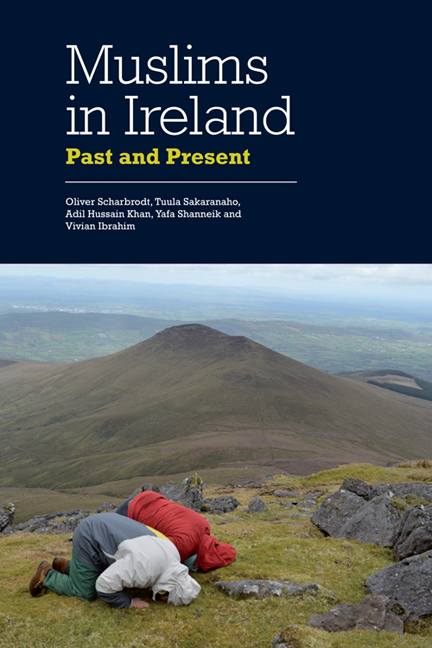Book contents
- Frontmatter
- Contents
- Figures
- Acknowledgements
- Introduction
- I History of Muslim Presence and Immigration to Ireland
- II Mosques, Organisations and Leadership
- 3 Early Muslim Organisations and Mosques in Ireland
- 4 Political Islam in Ireland and the Role of Muslim Brotherhood Networks
- 5 Mosque Communities and Muslim Organisations in Dublin and Other Cities
- III The Governance of Islam in the Republic of Ireland: Freedom of Religion and Islamic Education
- IV Diaspora and Identity
- Conclusion: Being Irish, Being Muslim
- Bibliography
- Index
5 - Mosque Communities and Muslim Organisations in Dublin and Other Cities
from II - Mosques, Organisations and Leadership
Published online by Cambridge University Press: 05 August 2016
- Frontmatter
- Contents
- Figures
- Acknowledgements
- Introduction
- I History of Muslim Presence and Immigration to Ireland
- II Mosques, Organisations and Leadership
- 3 Early Muslim Organisations and Mosques in Ireland
- 4 Political Islam in Ireland and the Role of Muslim Brotherhood Networks
- 5 Mosque Communities and Muslim Organisations in Dublin and Other Cities
- III The Governance of Islam in the Republic of Ireland: Freedom of Religion and Islamic Education
- IV Diaspora and Identity
- Conclusion: Being Irish, Being Muslim
- Bibliography
- Index
Summary
Introduction
There are a variety of other mosque associations and Muslim organisations reflecting the ethnic and sectarian diversity of Muslims. While in the past one or two mosques in a locality catered for the religious, spiritual and educational needs of Muslims from a diverse range of backgrounds, one can observe a trend towards an increasing diversification of mosque associations as a consequence of the growing number of Muslims. This trend is particularly strong in the Dublin metropolitan area, not surprisingly a result of the concentration of the Muslim population there. While in most cities and towns outside Dublin, such as Tralee, Ennis, Cavan, Carlow, Dundalk, Kilkenny, Kerry, Clare, Bandon, Waterford, Portlaoise and Mullingar, one mosque caters for needs of the entire Muslim population, in the larger cities of Cork, Galway and Limerick communal activities have begun to diversify as well.
While Shiis and Ahmadis have a long-standing presence in Ireland and have established their own communal infrastructures to maintain their distinct identities, South Asian Muslim communities, from Pakistan in particular, have grown significantly in the last ten years, leading to the formation of numerous new South Asian mosques and prayer rooms. Other organisations represent transnational Islamic movements, such as the Turkish Gülen movement, or efforts by community activists to challenge the dominance and political orientation of the two main Sunni organisations in Ireland. Located in warehouses, residential areas or shops, many of these new mosques lack financial resources and are less visible, yet more characteristic of Muslim communal life in Ireland. As they are often situated in planning areas not designated for places of worship, they have faced legal challenges.
South Asian Mosque Communities and Organisations in Dublin
The Blackpitts Mosque
An important mosque for Pakistani Muslims within walking distance of the Dublin Mosque on South Circular Road is commonly referred to as the Blackpitts mosque owing to its location on Blackpitts Road. The building was originally a warehouse, which was purchased by the Irish–Pakistani entrepreneur Mian Ghulam Bari, who operated the facility in accordance with its intended use for a number of years. Ghulam Bari established himself in the textile industry as a vendor of imported clothing, garments and fabrics in Ireland during the 1970s when he initially loaded his car with various items and drove from town to town selling products to newly developing retail shops around the country.
- Type
- Chapter
- Information
- Muslims in IrelandPast and Present, pp. 113 - 136Publisher: Edinburgh University PressPrint publication year: 2015

